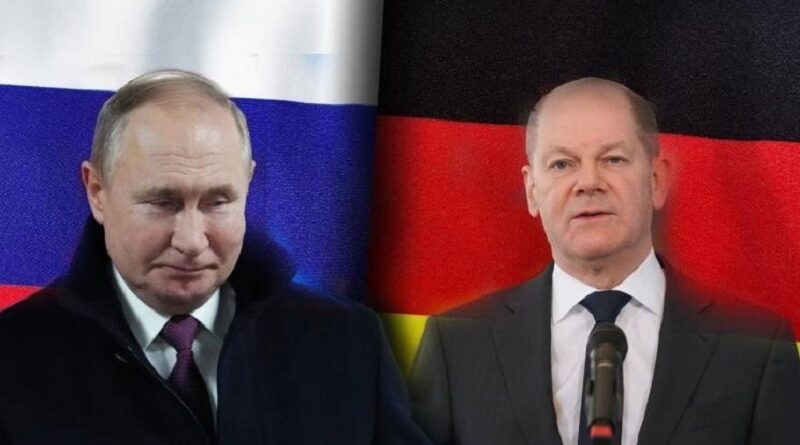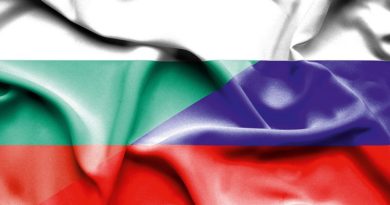Bailing out Vladimir?
The leaders of Germany and France are seeking to bail out Russian ruler Vladimir Putin—and to save their own special status under the Minsk agreements. The chances are that they won’t succeed. And the repercussions in Moscow could be grave.
It seems that Germany and France are running true to form. On Wednesday, German Chancellor Olaf Scholtz followed up his joint press conference with Vladimir Putin by telling German reporters that he was offering a possible way out—a face-saving formula—to Russian president Vladimir Putin, by seeking to grant him a legally binding commitment by Germany (and France) to disallow Ukraine’s membership in NATO. That says a lot about the Chancellor’s character—and his political pusillanimity.
President’s Zelensky speech at the Munich conference only add to the bitterness East Europeans feels about the current upshot of Germany’s Ost Politik.
Germany and France are the Western guarantors of the Minsk Process, which has fallen apart as Putin’s aggressive moves have disqualified both Paris and Berlin from acting as the West’s voice in sorting out Russia’s conflicts with its neighbours. The moment Belarussian President Lukashenka chose to side with Mr Putin and allow Russian troops in his country to threaten Ukraine, the process was dead.
Now, technically speaking, both Mr Scholtz and French President Emmanuel Macron could give personal assurances to the Russian Tzar that they will not allow Ukraine into NATO. And this might hold water, as membership in NATO is decided by a unanimous vote of NATO member countries. But Mr Putin wants a legally binding commitment, which means a document agreed (unanimously) within NATO. And this is a hard sell, even an impossible one.
For it runs counter to both the spirit and the founding principles of NATO, which oddly and ironically turn Mr Putin’s doctrine of ‘indivisible security’ doctrine against him. Ukraine’s security is indivisible too and it is Kyiv’s choice to join NATO, as it has been the choice of every other NATO member before it.
Ultimately, this outcome was the whole point in Putin’s game plan of bluffing and escalation. US Secretary of State Anthony Blinken didn’t blink. But Germany and France did. And the cracks in the West’s shield—the shields of both the EU and NATO—were exposed.
And the Kremlin wasted no time in returning the ball to NATO’s court and landing it in that court’s most vulnerable spot. That spot is Germany. Mr Putin’s strategic calculus is simple: now the Nord Stream-2 pipeline is in place, Germany is on the hook and can’t wriggle off it, can’t backtrack. Berlin simply has too much to lose.
These articles analyses and comments are made possible thanks to your empathy and contributions, which are the only guarantors of independence and objectivity in our work. The Alternatives and Analysis team.
Not just its privileged relations with Russia and its access to Russia’s resources. And not just the direct benefits it will derive from acting as broker of Russian gas within Europe (estimated at two or three billion euros a year, or even more). It also stands to lose its clout as the trendsetter of the EU’s integration process and of its economic and climate policies.
For, when the guns start talking, Berlin ceases to be the Titan of Europe and shrinks into a backstage role in line with the second-rate status it has imposed on itself-in geostrategic and military matters.
The question now is, how will NATO react? And, specifically, can Mr Macron and Mr Scholtz deliver on their promises to Mr Putin?
The answer is: not really unless they bring the US on board and Ukraine agrees. The current crisis has proven beyond doubt that Washington is in the lead in talking tough to Moscow and that there can be no bargain with Washington—or with NATO. The clout of both Paris and Berlin is on the wane and there is little chance that this trend can be reversed, given the magnitude of the stakes involved, and the consequences for NATO should the Berlin-Paris axis try to formalise the non-member status of Ukraine. They will certainly try and present this ‘compromise’ as the only tradeoff that could stop Mr Putin from invading Ukraine. Which is exactly where Russian foreign minister Sergei Lavrov’s ‘give diplomacy a chance’ call to his boss comes into play. The Russian president seeks a face-saving formula and Messrs Macron and Scholtz are ready to broker one.
Yet Mr Scholtz and Germany have disqualified themselves from being the voice of the West, of the EU and of NATO. Their credibility with Ukraine and Ukrainians is at an all-time low and is still sinking. Incidentally, it has sunk still further in the last day or so: the Russian troop ‘withdrawals’ from Ukraine’s border looked as if it might be an achievement Mr Scholtz could cite in his favour, but now it seems that such withdrawals were no more than a hoax.
So whatever promises the German Chancellor makes in the Kremlin, they will ring hollow in Kyiv, in Washington and in the capitals of Central and Eastern Europe (CEE).
Mr Putin has blundered. His mistake was to issue a hard ultimatum and to limit the bargaining power of his EU proxies. In doing so, he has awakened NATO, giving it a sense of purpose and a level of consolidation that it has not seen for decades—that, perhaps, it has not seen since 1989.
In what is, for Mr Putin, the worst-case scenario—and an increasingly likely one—CEE countries will cooperate with NATO, the US and Britain, and not with Germany. And Ukrainians will continue to mock German aid—the delivery of 5,000 helmets to Kyiv municipality as a ‘non-lethal’ weapon.
There could be more than one casualty on the Russian side. The outcome of the Russia-Ukrainian crisis will determine the fate of Russia’s foreign minister, who has failed to provide victory to his Tzar on the diplomatic field, by miscalculating the resolve of both Washington and Kyiv. And it might not be just Mr Lavrov’s career on the line. A war, instead of toppling the Ukrainian president and government, could well trigger processes back in Russia that might ultimately end in Mr Putin’s political demise.
Which would be one more tribute to the Law of Unintended Consequences as memorably formulated by Viktor Chernomyrdin, Russian prime minister back in the 1990s: “We tried our best, it came out as usual”
It seems that Germany and France are running true to form. On Wednesday, German Chancellor Olaf Scholtz followed up his joint press conference with Vladimir Putin by telling German reporters that he was offering a possible way out—a face-saving formula—to Russian president Vladimir Putin, by seeking to grant him a legally binding commitment by Germany (and France) to disallow Ukraine’s membership in NATO. That says a lot about the Chancellor’s character—and his political pusillanimity.
President’s Zelensky speech at the Munich conference only add to the bitterness East Europeans feels about the current upshot of Germany’s Ost Politik.
Germany and France are the Western guarantors of the Minsk Process, which has fallen apart as Putin’s aggressive moves have disqualified both Paris and Berlin from acting as the West’s voice in sorting out Russia’s conflicts with its neighbours. The moment Belarussian President Lukashenka chose to side with Mr Putin and allow Russian troops in his country to threaten Ukraine, the process was dead.
Now, technically speaking, both Mr Scholtz and French President Emmanuel Macron could give personal assurances to the Russian Tzar that they will not allow Ukraine into NATO. And this might hold water, as membership in NATO is decided by a unanimous vote of NATO member countries. But Mr Putin wants a legally binding commitment, which means a document agreed (unanimously) within NATO. And this is a hard sell, even an impossible one.
For it runs counter to both the spirit and the founding principles of NATO, which oddly and ironically turn Mr Putin’s doctrine of ‘indivisible security’ doctrine against him. Ukraine’s security is indivisible too and it is Kyiv’s choice to join NATO, as it has been the choice of every other NATO member before it.
Ultimately, this outcome was the whole point in Putin’s game plan of bluffing and escalation. US Secretary of State Anthony Blinken didn’t blink. But Germany and France did. And the cracks in the West’s shield—the shields of both the EU and NATO—were exposed.
And the Kremlin wasted no time in returning the ball to NATO’s court and landing it in that court’s most vulnerable spot. That spot is Germany. Mr Putin’s strategic calculus is simple: now the Nord Stream-2 pipeline is in place, Germany is on the hook and can’t wriggle off it, can’t backtrack. Berlin simply has too much to lose.
Not just its privileged relations with Russia and its access to Russia’s resources. And not just the direct benefits it will derive from acting as broker of Russian gas within Europe (estimated at two or three billion euros a year, or even more). It also stands to lose its clout as the trendsetter of the EU’s integration process and of its economic and climate policies.
For, when the guns start talking, Berlin ceases to be the Titan of Europe and shrinks into a backstage role in line with the second-rate status it has imposed on itself-in geostrategic and military matters.
The question now is, how will NATO react? And, specifically, can Mr Macron and Mr Scholtz deliver on their promises to Mr Putin?
The answer is: not really unless they bring the US on board and Ukraine agrees. The current crisis has proven beyond doubt that Washington is in the lead in talking tough to Moscow and that there can be no bargain with Washington—or with NATO. The clout of both Paris and Berlin is on the wane and there is little chance that this trend can be reversed, given the magnitude of the stakes involved, and the consequences for NATO should the Berlin-Paris axis try to formalise the non-member status of Ukraine. They will certainly try and present this ‘compromise’ as the only tradeoff that could stop Mr Putin from invading Ukraine. Which is exactly where Russian foreign minister Sergei Lavrov’s ‘give diplomacy a chance’ call to his boss comes into play. The Russian president seeks a face-saving formula and Messrs Macron and Scholtz are ready to broker one.
So whatever promises the German Chancellor makes in the Kremlin, they will ring hollow in Kyiv, in Washington and in the capitals of Central and Eastern Europe (CEE).
Mr Putin has blundered. His mistake was to issue a hard ultimatum and to limit the bargaining power of his EU proxies. In doing so, he has awakened NATO, giving it a sense of purpose and a level of consolidation that it has not seen for decades—that, perhaps, it has not seen since 1989.
In what is, for Mr Putin, the worst-case scenario—and an increasingly likely one—CEE countries will cooperate with NATO, the US and Britain, and not with Germany. And Ukrainians will continue to mock German aid—the delivery of 5,000 helmets to Kyiv municipality as a ‘non-lethal’ weapon.
There could be more than one casualty on the Russian side. The outcome of the Russia-Ukrainian crisis will determine the fate of Russia’s foreign minister, who has failed to provide victory to his Tzar on the diplomatic field, by miscalculating the resolve of both Washington and Kyiv. And it might not be just Mr Lavrov’s career on the line. A war, instead of toppling the Ukrainian president and government, could well trigger processes back in Russia that might ultimately end in Mr Putin’s political demise.
Which would be one more tribute to the Law of Unintended Consequences as memorably formulated by Viktor Chernomyrdin, Russian prime minister back in the 1990s: “We tried our best, it came out as usual”.
Ilian Vassilev
Thank you for your donations via PayPal and bank transfers to IBAN BG58UBBS80021090022940




